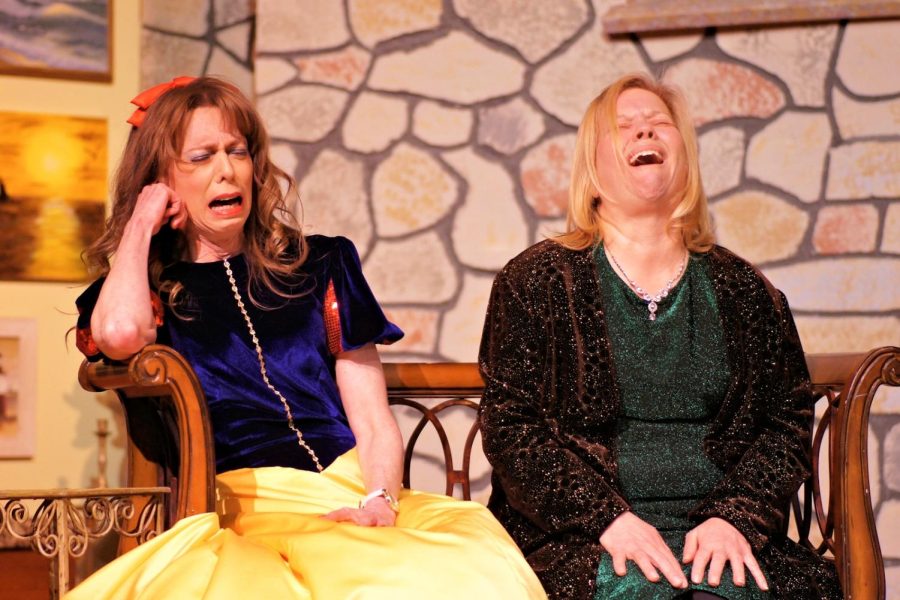ICCT presents ‘Vanya and Sonia and Marsha and Spike,’ gives humorous look into hope and family
The Iowa City Community Theater production debuted on Jan. 27-29, and will continue Feb. 3-5. The show features new and experienced actors, and had the help of more than 30 volunteers.
Contributed by Trent Yoder with Iowa City Community Theatre
Masha (Valerie Davine) and Sonia (Susan Fuhrmeister) cry themselves silly.
February 1, 2023
A great passion for theater is what unites the actors, crew, and volunteers that made the Iowa City Community Theater’s production of the Tony-Award Winning play “Vanya and Sonia and Masha and Spike” possible.
ICCT opened the show the weekend of Jan. 27-29 and will continue with three more performances on Feb. 3-5. Directed by Barry Schreier, the show focuses on the importance of having hope for the future and the struggles of facing disappointment.
“The reason we picked it is that it does such a great balance between being really funny and really heartfelt,” Schreier said. “It’s a really nice conglomeration of a lot of things in a comedy.”
Schreier shared that the play, originally written by Christopher Durang, talks about different family dynamics and experiences, as well as touching on themes like personality, ego, humbleness, and care.
The production experienced first-hand some of these themes of hope and disappointment. While it was originally set to run in 2021, the show was canceled due to the COVID-19 pandemic. The company had to remain hopeful, which paid off as they were finally able to put on the show.
“In a time in the world where it’s challenging and bad things happen and there’s a war and the economy is not good and we just survived a pandemic, it would be easy to let go of hope and get cynical and down,” Schreier said. “The idea that you must always have hope is such an important message.”
Casting for the show began in November 2022, and the team had 6 weeks to rehearse before the performances. First, cast members learned their lines, and then figured out where they need to be on stage.
“Then we throw costumes at them, and lights and music, and we put it all together and make it work, and then you see the product as it is today,” Schreier said.
RELATED: Riverside Theatre’s ‘Will Power’ workshops help high school students learn Shakespeare
More than 30 volunteers were involved in the production, whether they were on stage or backstage, making sets or working on music design. Iowa City Community Theater is a completely volunteer-run theater company, all involved just for their love of theater.
For some, this show was their first performance in the theater. Susan Fuhrmeister, who plays Sonia, has never been in a production before, but has always wanted to be. She shared that she had never felt brave enough or like she had enough time to be in the theater. But with a new schedule, she figured she might as well give it a shot.
“I love the show, it’s so funny,” Fuhrmeister said. “Once we got off script and everyone could do their little nuances with their movements or their gestures and reactions, it just became even so much funnier. I think the actors really make the characters their own.”
Fuhrmeister shared that she felt she could relate greatly to her character Sonia. Sonia is the adopted sibling of Masha and Vanya, and lives with Vanya, her brother. Fuhrmeister shared that she is also adopted and lives next door to her brother.
“Even in the worst of circumstances when you don’t feel like anything is going right, you can always have hope, that’s kind of what the play is about,” Fuhrmeister said. “Maybe if you just keep trying to be a little bit positive, you might achieve what you want.”
Other actors, such as Mackenzie Elsbecker, who played Nina, have had more experience in the theater. Elsbecker graduated from the University of Iowa in 2019, where she studied theater. Since then, she has been involved in several theater productions.
“I think my favorite part is that last monologue from Vanya. The play was written in 2012, but just thinking of it in 2023, and how relevant it still is,” she said.
Elsbecker shared that she comes from a big family and liked being a part of family dynamics on stage. She liked portraying the hopes and regrets and their hopes and dreams.
Fittingly, Elsbecker’s character says at the end of the play, “You must always get your hopes up,” a line that carefully wraps up the themes of the play.















